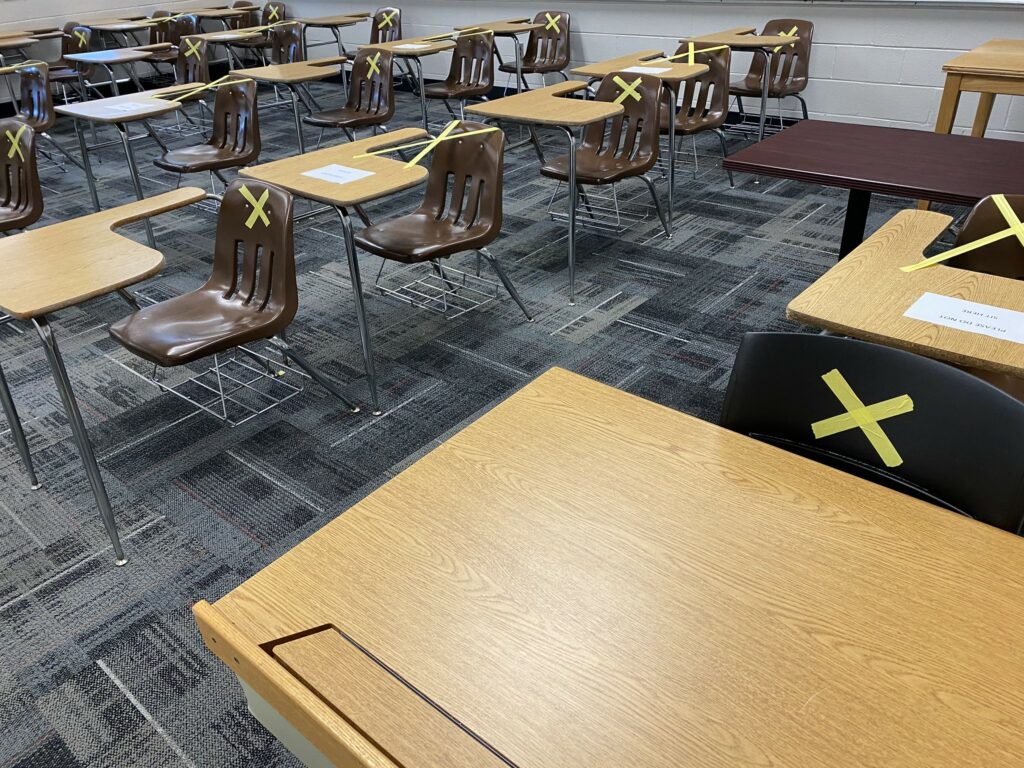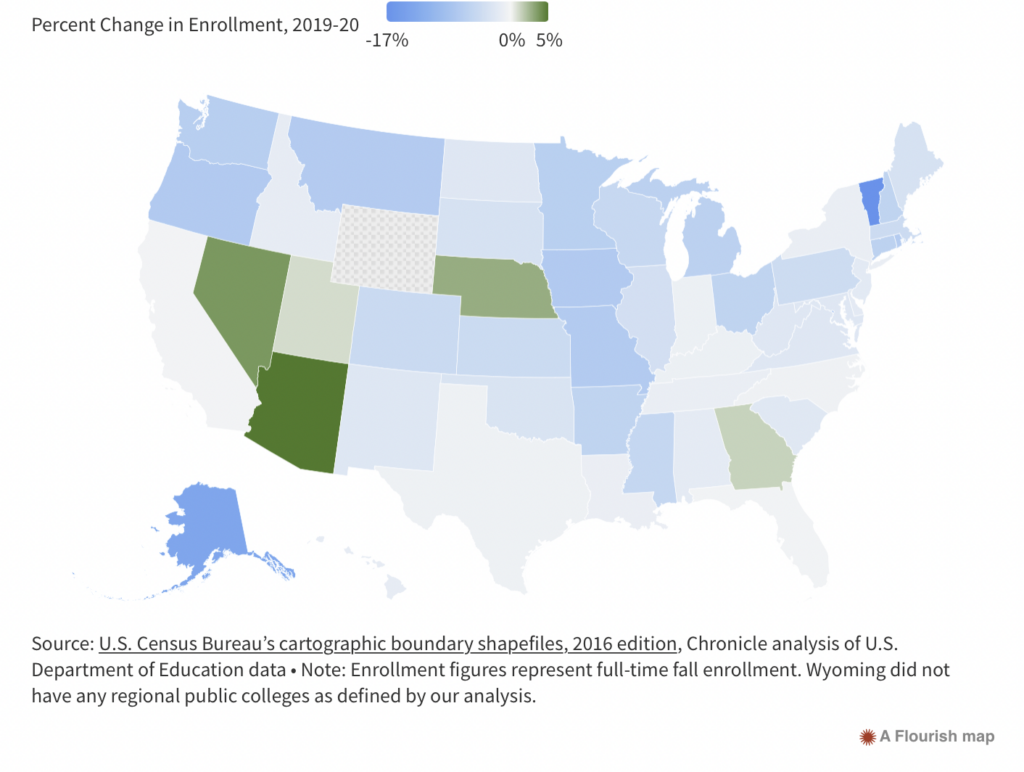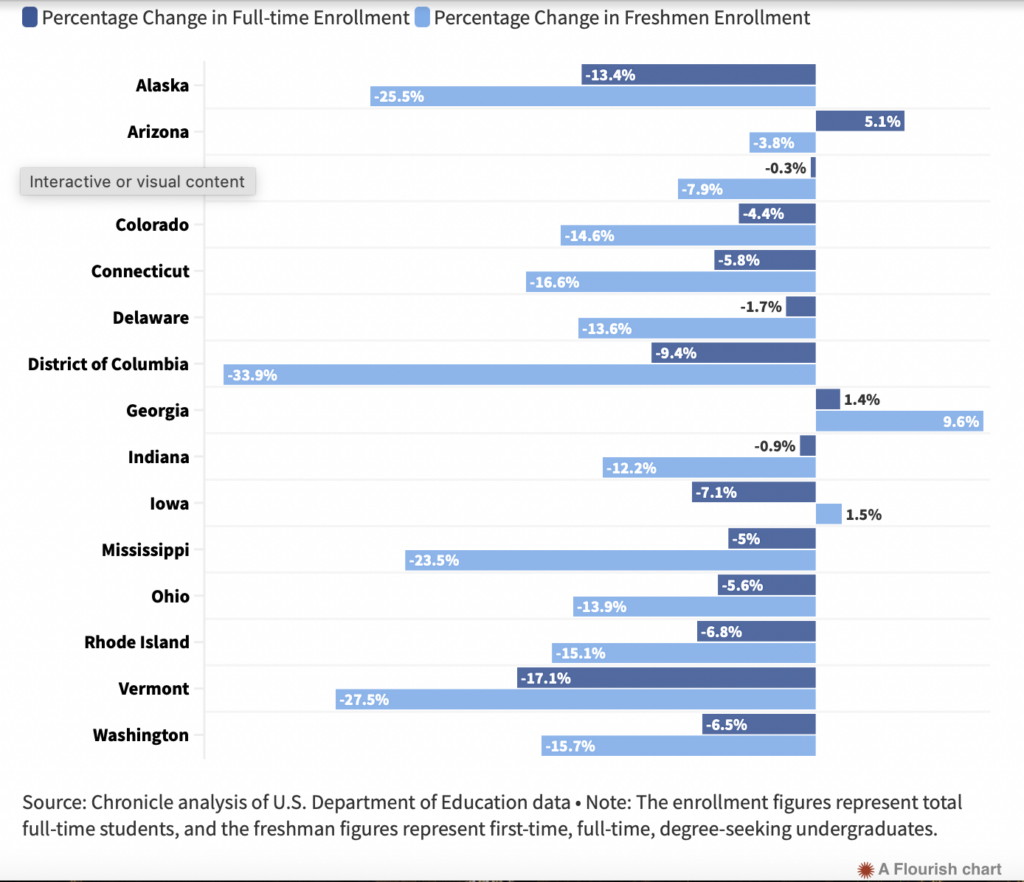Higher Ed and the Pandemic
Enrollments are down.

The Chronicle of Higher Education reports: What the Pandemic Did to Enrollments at Regional Public Colleges. The simple answer is that it reduced enrollments.
We defined regional public colleges as four-year, public institutions with the Carnegie classification of either doctoral, master’s, or baccalaureate institution. Doctoral universities with “very high research activity” and flagships were excluded.
Overwhelmingly, regional public colleges saw drops in full-time enrollment — nearly three out of four institutions experienced declines from the fall of 2019 to the fall of 2020. Nationwide, enrollment for this group of institutions dropped by 2 percent, representing over 65,000 students.
[…]
Just five states experienced growth in their regional public institutions. Vermont and Alaska fared the worst — with regional public colleges in those states seeing a drop of 17 percent and 13 percent, respectively.
[…]
More than two out of three states saw enrollment at regional public colleges drop more than it did at flagship institutions in those states. Here’s where the biggest differences were.

This is all in the context of demographic trends already causing issues for schools in many states (e.g., slow population growth and/or declines in high school graduates).
Some small population states are going to face some serious questions going forward unless there is some massive turnaround (which is unlikely).

The expense of education is an important part of the problem. But where are the 18-25 year olds? Their unemployment rate is 8.5%, and I image that many that are employed are in low skill, low pay jobs in food service. I have no way of knowing what a forty five year old will think about career outcomes in 2045, but I doubt that without a diploma as a safety device working at a Starbucks during the 2020s will turn out as a great move. My group of friends spent 1975-1985 hanging out, drinking beer, and cheap outdoors stuff like backpacking, but we had diplomas and one by one found opportunities. My sister waitressed, hung out, then went to law school. She had a BS from a state school that enabled this.
We have a duty to make education affordable.
Given that a lot of schools went virtual during the portion of the pandemic when we weren’t on the side of Covid, and still charged a fortune, I wonder if part of this is caused by older friends and siblings having had a poor experience.
I could see postponing college for a bit, and doing basically anything else, waiting to make sure college would remain open.
(Also, a little surprised to see the map not show any of the usual patterns — no big confederacy or coasts)
@Slugger: @Gustopher: Of course, no one can ever be sure about these things, but one of the messages some of my younger students in Korea were telling me back 8 or 10 years ago was that their older siblings were starting to tell them that going to college didn’t always pay off anymore. I didn’t hear that message as much as I moved out of Daegu, but I was teaching mostly at vocational schools, so students were pretty confident about their futures. And either way, it’s not like Korean children get very much choice about their futures until they get married, but the message that higher ed doesn’t have a guaranteed payoff anymore and the “do what you love” message has been found wanting for many–I did what I loved and it worked out okay, but only because I didn’t need anything beyond personal satisfaction. Especially after my divorce.
I do agree that going back to affordable education would be an inducement, but some significant amount of “affordable” comes down to work paying enough to support someone while they go to school. Lowering tuition does little in areas where students can’t afford to live to begin with. Most “affordable” schools are already in cities, so the livability factor may be the bigger issue.
@Gustopher: Some variation on this. Speaking broadly, higher education administrators, and to a lesser degree faculty, made a horrible decision in fall 2020: to deliver a product that almost everyone would regard as inferior, but at the same prices. Lots of places where the tools and training for the faculty to prepare were really bad*. Variations on the same mistake for the 2021-22 school year as well. It’s going to take years for the academy to regain the lost trust.
* I did research on multi-party multi-media real-time communications over internet protocols starting almost 30 years ago. One of the problems I used was a TA’s office hours for Calc I. So far as I can tell, the commercial software vendors haven’t provided suitable tools for that despite the enormously greater processing power and bandwidth available.
I wonder how much this was impacted by lack of foreign students. My moderate-sized (7K) local community college (which does have some Bachelors programs such a nursing) had enrollment offices in Japan (Kyushu) and Korea (maybe southern China too). Some of the students transferred to regular local 4-year programs.
I would point out that this article was written in the middle of Fall 2021, so it only captured the immediate impact of the pandemic and not any longer term enrollment trends.
The deal has changed.
When I was college age – mid 80s – the deal was that you attended college, graduated with a reasonable degree in an in-demand profession, and you were assured a decent living standard.
That’s no longer the deal.
Universities have become very, very corporate. Football programs have dwarfed education. Student dining centers are awe-inspiring works of architecture, workout facilities have the latest equipment and trainers, and campuses are focused on recruiting students with money – people who can keep the grift alive.
Further, people see their peers graduating with 4-year degrees, and working behind the counter at Starbucks. Don’t need a degree for that job, so what’s the point?
When I was growing up, you got a degree as much for the improved appreciation of art, music, and literature as you did for your engineering degree. People of culture were expected to understand such things.
Kids these days don’t want our antiques or grandma’s china, nor do they want to spend a bunch of time learning stuff that won’t directly affect their ability to make money.
These days, trade schools – hell, high schools, crank out FTEs just as well as colleges do.
When you make *money* the absolute point of everything in life, this is what you get.
Merry Christmas!
While schooling is of value to help train you to think like an engineer, the others you mention can better be developed by watching youtube videos or more formally with Great Courses course. You certainly don’t need to risk the hit or miss of the random person the university hires to learn it and hope they don’t try to make it all about some agenda. Maybe there’s an argument for the forced taking of such courses, but the courses themselves are not necessary to gain access, such as they offered in 19080 where to get the sampling in my music appreciation course would have been costly and difficult for the unlearned, same for the art appreciation. And when I took the film appreciation elective, BW movies were not readily available. But a few years later, TCM and AMC were up and running.